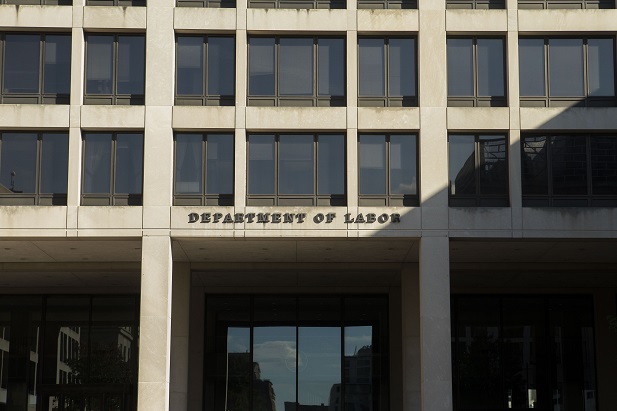 U.S. Department of Labor in Washington, D.C. (Photo: Diego M. Radzinschi/ALM Media
U.S. Department of Labor in Washington, D.C. (Photo: Diego M. Radzinschi/ALM Media
The Department of Labor has now finalized its proposal to create a new "safe harbor" for the electronic distribution of ERISA-required notices and disclosures. The new safe harbor should be welcome news to virtually all employers who sponsor ERISA-covered retirement plans. Not only should the rule facilitate the distribution of important plan-related information, but it should greatly reduce the costs and burdens on plan administrators. It really may be a "win-win" regulation.
Although the final rule is not effective until 60 days after its publication in the Federal Register, the DOL has indicated that it will not take any enforcement action against a plan administrator that relies on the safe harbor before that date.
Therefore, the electronic delivery safe harbor is essentially available immediately. This is good news, particularly given the number of employees who are currently working remotely due to the COVID-19 pandemic.
Document delivery permitted in either of 2 ways
The final regulation establishes a new, voluntary safe harbor for retirement plan administrators who want to use electronic media, as a default, to furnish covered documents to participants and beneficiaries, rather than providing paper documents through mail or hand delivery. The new safe harbor permits electronic delivery by either of two ways:
- Posting covered documents on the plan sponsor's website, if appropriate notification of internet availability is furnished to the participant's electronic address, or;
- Sending the documents directly to the participant's electronic address, with the covered document either in the body of the e-mail or as an attachment.
Before this final rule, in order to provide participants with ERISA-required notices and disclosures by electronic means, plan administrators had to satisfy a complicated regulatory safe-harbor established by the DOL in 2002.
Those regulations, which generally limit electronic delivery to employees whose jobs require them to work at a computer, do not reflect how technology, and use of that technology, has evolved since 2002.
In 2018, an Executive Order was issued directing the DOL to review whether regulatory actions could be taken to make retirement plan disclosures more understandable and useful for participants and beneficiaries. The Order specifically emphasized that the review should address broader use of electronic delivery as a way to improve the effectiveness of the disclosures while also reducing the cost and burden on plan administrators.
In October of 2019, the DOL published a proposed regulation that would create a new, separate safe harbor for plan administrators who wish to use electronic media as the default means of providing retirement plan notices and required disclosures, rather than as a limited "alternative" to delivery of paper. The final rule basically follows the 2019 proposal, with minor tweaks based on comments the DOL received.
New voluntary safe harbor
The new safe harbor is limited to retirement plan disclosures. It does not apply to ERISA-required notices for health or welfare plans, and does not apply to notices required solely by the IRS, such as the Special Tax Notice that must be provided in advance of an "eligible rollover distribution," or notices required by another government agency.
In addition, the safe harbor is limited to certain "covered documents" that are provided to "covered individuals" who have a valid electronic address (such as an e-mail address or a smartphone number). The new safe harbor does not supersede the 2002 safe harbor; instead, the 2002 safe harbor remains in place as an additional option for plan administrators.
Protection for plan participants
The new safe harbor includes certain protections for covered individuals, including the following:
Right to paper — Covered individuals may request paper copies of specific documents, or globally opt-out of electronic delivery entirely, at any time, free of charge.
Initial notification — Administrators must furnish covered individuals with an initial notification, on paper, advising the individual that all future notices will be delivered electronically, unless they exercise their right to opt-out if they prefer paper. This notification must be given before the plan can use the new safe harbor, and it must specifically describe the delivery method and the electronic address to which notices will be sent.
Notification of internet availability — If a given notice or disclosure is going to be posted on the administrator's website, covered individuals must generally be furnished a notice of internet availability (NOIA) each time a new covered document is made available for review on the website. However, the final rule does permit an "annual" NOIA to include information about multiple covered documents, rather than providing multiple NOIAs throughout the year. The NOIA must describe the document that is being posted, it must include an address or hyperlink to the website, and it must remind covered individuals of their right to request a paper copy of the document, as well as their continuing right to opt-out of future electronic delivery altogether.
Website retention — Documents that are "delivered" by website posting must remain on the website until superseded by a subsequent version, but in no event for less than a year.
System check for invalid electronic address — Regardless of which of the two optional methods of delivery is used, administrators must ensure that the system is designed to alert them if a covered individual's electronic address is invalid or undeliverable. There is a separate requirement to verify the continued accuracy and operability of the covered individual's electronic address following such individual's termination of employment.
© 2025 ALM Global, LLC, All Rights Reserved. Request academic re-use from www.copyright.com. All other uses, submit a request to [email protected]. For more information visit Asset & Logo Licensing.







